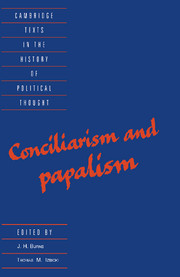Book contents
- Frontmatter
- Contents
- Editors' note
- Introduction
- A note on terms
- Chronology
- List of abbreviations
- Bibliography
- 1 On the comparison of the authority of pope and council
- 2 A book concerning the authority of the Church
- 3 The apology of Brother Tommaso de Vio … concerning the authority of the pope compared with that of the council
- 4 A disputation concerning the authority of the council over the supreme pontiff
- Index
- Cambridge Texts in the History of Political Thought
Introduction
Published online by Cambridge University Press: 05 June 2012
- Frontmatter
- Contents
- Editors' note
- Introduction
- A note on terms
- Chronology
- List of abbreviations
- Bibliography
- 1 On the comparison of the authority of pope and council
- 2 A book concerning the authority of the Church
- 3 The apology of Brother Tommaso de Vio … concerning the authority of the pope compared with that of the council
- 4 A disputation concerning the authority of the council over the supreme pontiff
- Index
- Cambridge Texts in the History of Political Thought
Summary
Three of the texts translated in this volume were the immediate by-products of a sharp if short-lived crisis in the ecclesiastical politics of the early sixteenth century. Written during a period of little more than a year, the tracts by Tommaso de Vio (1468–1534: better known, and referred to below, as Cajetan) and Jacques Almain (c. 1480–1515) are essentially polemical in character, albeit highly technical in content and style. The text by John Mair (c. 1467–1550) – unlike the others, an extract from a much longer work – provides an epilogue. The echoes of the crisis of 1511–12 still indeed reverberated half a dozen years later; but Mair was not engaging in what might be called the hand-to-hand fighting of controversy when he turned, in his 1518 commentary on St Matthew's gospel, to the issues that had embroiled his brilliant pupil Almain with the master general of the Order of Preachers. And even when reading the writings of Cajetan and Almain we are not confronted only – or even mainly – with specific questions as to the status and claims of the council (or what purported to be the council) of the Church which met in Pisa and Milan at the time when those works were written.
- Type
- Chapter
- Information
- Conciliarism and Papalism , pp. vii - xxiiiPublisher: Cambridge University PressPrint publication year: 1997
- 1
- Cited by

